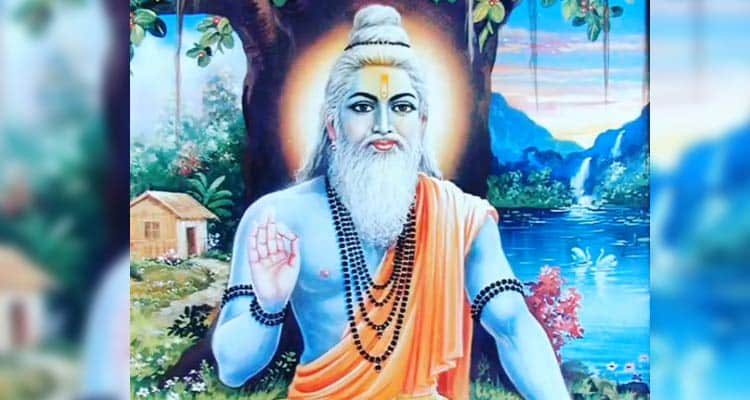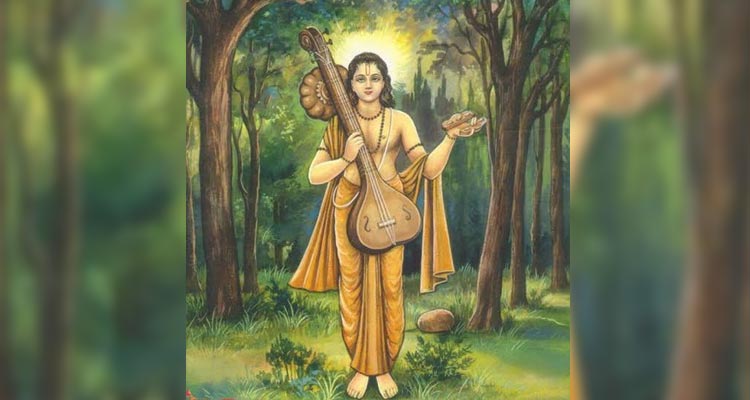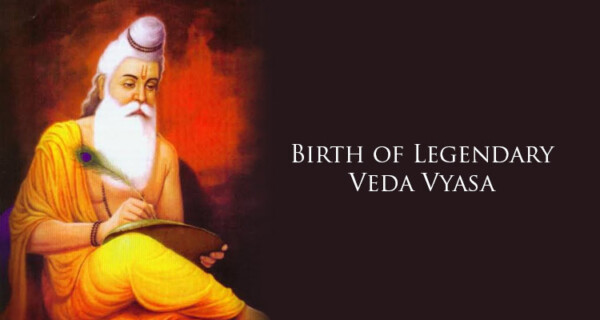Vyas, also known as Veda Vyasa, is the legendary author of the world’s bulkiest epic Mahabharata as well as the ancient Vedas and Puranas. He is a well-known mythical figure. The Chiranjivi (immortal) sage whose birthday is celebrated as the festival of Guru Purnima. But not many know the answers to pertinent questions about Veda Vyasa history – When was Veda Vyasa born?, Who is Veda Vyasa in Mahabharata?, and Who are the parents of Rishi Vyasa? – to name a few. Let’s explore the tale of Veda Vyasa birth to find out:
Related Reading: Tracing The Legend Of King Bhagiratha’s Birth Out Of Queer Romance
The Legend of Veda Vyasa Birth
Table of Contents

Vyas is believed to be an expansion of Lord Vishnu, one of the trinity. He was created when Vishnu for the first time uttered the syllable ‘Bhu’. He is also considered immortal, as he wasn’t birthed. Vyas came to earth during the Dwapar Yug and bestowed with the duty to convert all Vedas and Puranas from oral to written versions. Besides having written the epic, he played a pivotal role in Mahabharata.
Tracing the legend of Veda Vyasa’s birth, one uncovers that the relationship between his parents is unconventional and objectionable, even by the moral standards of the modern world. So, who are the parents of Rishi Vyasa? He is the son Satyavati and Rishi Parashar – a fisherwoman and a wandering sage.
Related Reading: Draupadi And Krishna – Was It Platonic Love?
A sage in grips of attraction
One day, Sage Parashar was in a rush to reach a place to perform a yagna. River Yamuna fell on his path. He spotted a ferry and requested to be dropped across to the bank. As Parashar sat in the boat and breathed a sigh of relief, his eyes fell on the woman ferrying the boat. In the backdrop of dawn, the beauty of this fisherwoman named Satyavati left him awestruck. In the early morning breeze, her curly locks danced on her face, even as her delicate arms moved in a circular motion, rowing the paddles.
Enticed by her beauty, Parashar felt a strong surge of attraction rise within him. He recalled the blessing of Shiva: ‘you shall be the father of a meritorious son’.
Parashar knew it was the right time for him to become one. He expressed the desire for copulation to Satyavati. Having come of age, Satyavati too found herself in the grip of carnal urges. But she was in a dilemma, for the repercussions of the act would last a lifetime. But if she denied the sage, he could angrily topple the boat or curse her with an ill prophecy.
Related Reading: Sarama Stood By Her Husband Vibhishan But He Married Ravana’s Wife Mandodari
A young woman riddled with doubt
She spoke hesitantly, “Oh, Great Munivar! I am a fisherwoman. I smell of fish (Matsyagandha). How will you bear my body odour?” Without a further word, Parashar blessed her with a boon of musk-smelling (Kasturi-Gandhi) body. Unable to hold himself, he shifted next to her. She retreated, sighting other doubts:
“A baby outside the wedlock will cast aspersion on my purity.”
Also looking around at the open river and sky, she retreated further.
“Anyone can see us out here in the open. It can invite trouble for us, and me more than you.”
Vyasa is born
Quickly rowing to the nearest bank, Parashar built a bushy hideout, removed from the village area. He also promised her that her virginity would remain intact after the act. Assured by the sage and his divine powers, Satyavati birthed him a son in the bushy hide-out without anyone’s knowledge.
The boy was born with divine genes of Rishi Vashishtha, his great grandfather, and so Parashar named him Vyas.
Who is Veda Vyasa in Mahabharata?

Image Source: @idark_kinght Twitter
Parashar took Vyas with him and promised Satyavati that when needed, her son will come to her aid. Parashar washed himself and his memories of Satyavati in the river Yamuna. He left with Vyas and never met Satyavati again.
Even Satyawati returned to her community and never spoke about the incident. She kept this secret even from King Shantanu, her future husband. No one knew of it, until when she shared it with Bhishma on becoming the Rajmata of Hastinapur.
Veda Vyasa gives Hastinapur its heir
Satyavati married King Shantanu and bore him two sons, Vichitravirya and Chitrangada. Shantanu’s death and Bhishma’s promise to not to ascend on the throne of Hastinapur, led to the coronation of her sons. Satyavati became a Rajmata. Her sons married while Bhishma adhered to the oath of celibacy. Hastinapur prospered under Vichitravirya’s rein.
But as destiny would have it, both Vichitravirya and Chitrangada died of illness without giving Hastinapur an heir to the throne.
The throne lay vacant, inviting other empires to attack and usurp their kingdom. Desperate for a way out of impending doom, she remembered her son, Vyas. She had heard of him as a renowned seer, a powerful personality with divine powers and intellect.
She confided in Bhishma and shared the truth about how and when was Veda Vyasa born. With Bhishma’s help, she arranged for the widowed queens, Ambalika and Ambika, to procreate with Vyas for the sake of an heir.
On the request of his mother, Vyas fathered Dhritrashtra and Pandu, the future kings of Hastinapur, along with Vidura – who was born to the queens’ lady-in-waiting and grew up to be an astute scholar and advisor to the kings.

Related Reading: Karna’s Love Letter To Draupadi: It Is You Who Defines Me The Most
Is Veda Vyasa Still Alive?
Veda Vyasa was created and not born, so he is considered immortal. He resides in the Himalayas, as per our mythological accounts. According to Srimad Bhagavatam, Veda Vyasa lives in a mystical place called Kalapa Grama. At the end of Kaliyuga, he will fulfil his destiny to revive the Surya dynasty by producing a son.
Veda Vyasa Birth – A Story That Resonates Even Today
Society still considers flings like the one between Satyavati and Rishi Parashar immoral. They are secrets that are let out as confessions with anonymous names and faces. We may live in a different yug but a child born outside the wedlock is still called a mistake. Such conceptions are terminated in the womb itself more often than not. Even if they are birthed, they live with baggage of social taboo.
Your contribution does not constitute a charitable donation. It will allow Bonobology to continue bringing you new and up-to-date information in our pursuit of helping anyone in the world to learn how to do anything.





















